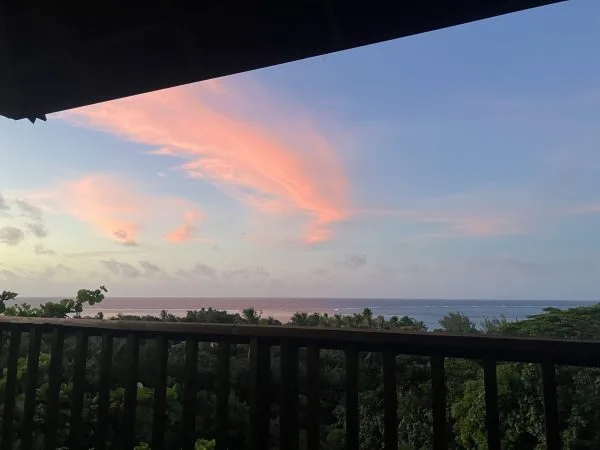Programs Blog
Adjusting to Land
May 08, 2024

Author: Amanda Newcombe, Bowdoin College
Our first couple of days in Moorea have been a whirlwind of adjusting to life on land, fun, and exploration. After living on a boat with the same 38 people for over a month, there are basic things on land that take readjusting to – the tables not being gimbled, waiting for cars to pass to cross the street, and having to walk more than 134 ft to get anywhere to name a few. Being on land also comes with its joys, such as contacting family, regular sized beds, and long showers. This being said, there are many things I miss about the boat including, but certainly not limited to, the community, science deployments, sail handling, helm, and lookout.Luckily, the transition back to land has been full of fun exciting activities! I’ve gone swimming multiple times each day since being here, and getting to go night swimming while watching bioluminescence was a very special experience. I’ve also really enjoyed swimming at the beach and jumping off the dock at Gump Station. To top it all off, snorkeling adds an extra cool dimension to swimming. While the coral near here is predominantly dead, it is currently still providing a habitat for many species, the rays and vibrantly colored fish being among my favorite things I’ve ever seen in the ocean. Beyond the swimming, another special aspect of Gump Station is the view. I’m staying in one of the hillside bungalows, so, after a steep trek up the road to the bungalow, I can enjoy sitting on the balcony with views of the mountains and ocean, which is especially nice after it cools off in the evening and the sun begins to set.After a free day yesterday filled with swimming and snorkeling, today we resumed class (but still had time to swim and snorkel!). In the morning, we took a field trip to an ecological museum where we learned about the geology, ocean ecosystem, and culture of Moorea. After lunch, we met in our research groups to plan out and work on data analysis. Sitting on the balcony listening to birds and insects with a cool breeze while overlooking the ocean is a very special environment to be in while analyzing physical ocean properties and copepod biodiversity data!Amanda Newcombe, Bowdoin College
https://sea.edu/wp-content/uploads/2024/05/IMG_8617-scaled.jpeg
Recent Posts from the Ships
- Ocean Classroom 2024-A collaborative high school program with Proctor Academy
- Collaborations and Long-term Commitments: SEA’s Caribbean Reef Program Sets a Course for Coastal Programs that Compliment Shipboard Experiences.
- Sea Education Association students prepare for life underway using state of the art nautical simulation from Wartsila Corporation.
- SEA Writer 2022, Magazines From the Summer SEA Quest Students
- Technology@SEA: Upgrades Allow Insight into Ocean Depths
Programs
- Gap Year
- Ocean Exploration
- High School
- Science at SEA
- SEA Expedition
- SEAScape
- Pre-College
- Proctor Ocean Classroom
- Protecting the Phoenix Islands
- SPICE
- Stanford@SEA
- Undergraduate
- Climate and Society
- Climate Change and Coastal Resilience
- Coral Reef Conservation
- Marine Biodiversity and Conservation
- MBL
- Ocean Exploration: Plastics
- Ocean Policy: Marine Protected Areas
- Oceans and Climate
- Pacific Reef Expedition
- The Global Ocean: Hawai'i
- The Global Ocean: New Zealand